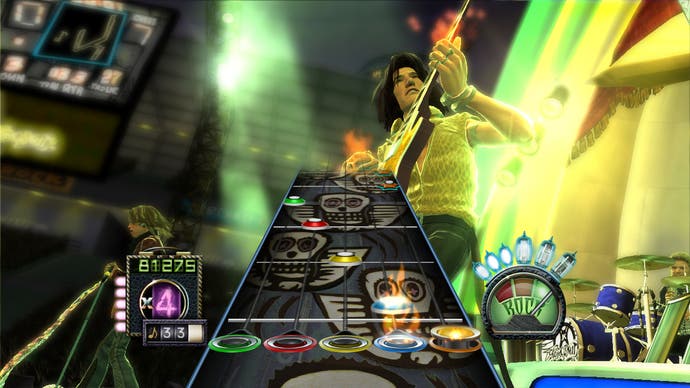Guitar Hero: Aerosmith
Hero protagonists.
The venues are nicely appointed, though, and caricatured in Guitar Hero's traditional cartoon style, but, as ever, if you're actually playing then they're only things you glimpse out of the corner of a focused eye (and if you're not playing, you probably aren't the person who owns the game, because that's how we guilt people into sitting out). Otherwise you need to get excited about being able to unlock a DMC or Brad Whitford character model. Some of the novelty guitars are amusing, but then so are the non-Aerosmith novelty guitars, and the other Guitar Hero games (not to mention Rock Band) are already stuffed with them.
As for the game on its own merits, it's fundamentally the same as Guitar Hero III, which means the same excellent and refined rhythm-action mechanics: hold frets and strum the bar as notes pass through the bottom of the gameplay area, swing the neck skyward for Star Power, and hammer the whammy bar for extra points during long notes. GH3's contentious Guitar Battles - face-offs with superhero guitarists through the ages - are reduced to one key, skippable encounter with Joe Perry here, which remains irritating. The difficulty doesn't spike as aggressively as GH3's, although some passages might send you into the game's Practice mode to learn things in slow motion first - it took us about half an hour of learning by rote to master enough of "Walk This Way" on hard, for instance. Other than that it's business as usual, with offline and online multiplayer, quick play and familiar characters to play as before you unlock the big-name stars.
So it is the songs that matter, and realistically you need to digest the track listing to make your mind up. Do you know "Movin' Out", "Uncle Salty", "Back in the Saddle" and "Livin' on the Edge"? We can't answer that stuff for you, and if you refuse to look then we can only reiterate that most of it's from the '70s, "Dude (Looks Like A Lady)" is absent and more recent songs like "I Don't Want To Miss A Thing" and "Jaded" are also nowhere to be found.

All of which makes Guitar Hero: Aerosmith almost impossible to rate. There's objective discussion of the non-music bits to be had, and it goes like this: it's not so startlingly revealing that it'll be serialised in the Mail on Sunday, but there's some interesting stuff in the documentaries, and the venues, guitars and character models represent competent rather than spectacular fan service.
The x-factor though is your own musical taste, and it will swing the score below up and down your own scale. Our feeling is that in this era of downloadable Rock Band albums for 13 quid - a price that's often criticised anyway - single-band games will have to offer gameplay innovations, spectacular fan service, or a lot more material than this to justify their existence and, more pertinently, an asking price of 40 quid without the guitar peripheral. Guitar Hero: Aerosmith entertained us sporadically - usually when we knew the songs, some of which are very well implemented - but the broader context of the current music game market boos the small scale off the stage before it's had a chance to tune up.

